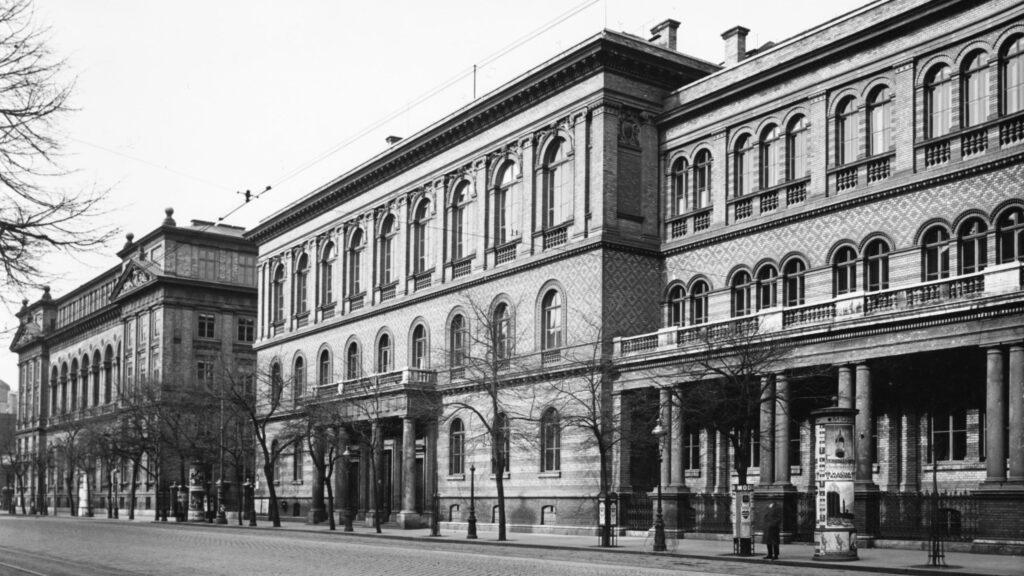Defining and redefining political ideologies is simply a must, just as important a task today as centuries ago when modern political thinking was born. No political force or establishment can label itself as adhering to one of the ‘isms’ without constant introspection regarding what it actually stands for. Conservatism is no different. It is, perhaps, more vaguely defined today than any other political and social current, such as progressivism for instance. While exceptionally spot on, I guess Roger Scruton’s famous saying (‘Conservatism is more an instinct than an idea’) helps little to solve this inherent ambiguity. After all, most modern political theories were hand-crafted by the intellectuals of a given age, while conservatism appears to have organically sprung up from millennia of shared experiences and traditions.
But as conservatism is being forced out of an increasing number of arenas and institutions today, the need to (re)define it is greater than ever. If we as a society are to get back on the right track, we ought to be clear on the directions first. That is why the Budapest-based Danube Institute, among others, is tirelessly hosting discussions that contribute to the strengthening of the theoretical bases of our understanding of politics. Earlier this week, the Institute held an event titled ‘New Conservatism for Old’, attempting to define the new directions to take—or what old principles to rediscover—for conservatives to regain a foothold in our post-liberal age.
The panel discussion was moderated by John O’Sullivan, the President of Danube Institute and Margaret Thatcher’s former advisor. The speakers and panelists included three experts on the topic with rather different backgrounds. The main lecture of the evening was given by Dr Ofir Haivry, Vice-President of the Herzl Institute of Jerusalem and co-founder of the Edmund Burke Foundation in Washington DC. Reflecting on his words were Professor Ferenc Hörcher, a well-known Hungarian political philosopher and member of the Hungarian Academy of Sciences, as well as Rod Dreher, the bestseller political writer and senior editor of The American Conservative.
Why Do We Need New Definitions?
Dr Haivry started out by reaffirming what O’Sullivan said in his introduction, namely that there is indeed an ‘old’ and a ‘new’ conservatism which is not necessarily a continuous tradition. It’s easy to outline what the ‘old’ was, based on its successes, successes that also brought about its eventual demise.
‘Old conservatism’ was about individual liberty and economic freedom
As early as in the late 60s and early 70s, people started to regard conservatism as a thing of the past. As Dr Haivry recalled the zeitgeist of the era, ‘a conservative [was viewed as] …someone who manages the decline; the future belongs to progressives.’ Yet, conservative political forces were still in control of most institutions because of their strong sense of purpose in a time marked by an existential war between the two global poles. ‘Old conservatism’ was about individual liberty and economic freedom that eventually emerged victorious against communism. But as the Cold War faded into memory, so did the appeal of conservatism. Suddenly it lost purpose and became splintered throughout the West. So many parallel conservative currents emerged in different countries that the term started to lose its meaning. Uniting them, therefore, is key to preserving the idea itself. But where to begin?

The scholarly consensus seems to regard conservatism, notes Haivry, as something that was born out of—or rather, against—the French Revolution. Haivry thinks this observation is false, as ‘nothing good came out of the revolution.’ Whatever sound and reasonable principles it bore, in the end, were ultimately ‘poisoned at their core’. Besides, all the aspects of the classical liberal thought that the French tried to institutionalise had originated in ancient history. The strongest and most enduring conservative values, Haivry said, were produced by the British—precisely because they weren’t set by a constitution but by organically developing laws. Today, tradition is perceived as an obstacle to social and political advancement, but according to Haivry, the opposite is true. Traditions are the instrument of responsible development: only truly viable structures can endure the test of time.
The Three Principles of Enduring Conservatism
Therefore, ‘traditionalism is a key to political conservatism’, Haivry said. ‘But two more elements are needed for it to be complete.’ One is national identity which is primarily manifested in a shared historical continuity. It is needed to provide tradition with stability in order for it not to be swept away by outside forces and influences. And the other is morality, to hold the structure together, based on religious, biblical values. For the Bible is the origin of many fundamental political theses in the West, such as equality in the eyes of God and, therefore, before the law, just to name one.
It is these three components—traditionalism, national identity and biblical values—that make up political conservatism. Their importance becomes even more apparent when we realise that every authoritarian regime seeks to destroy them. ‘Not only dictators’, noted Haivry, ‘liberals too.’ Modern liberals wage war on traditions, identity and religion because they stand in the way of their ultimate goal, individualism. And to replace these three core elements, they promote their own unholy trinity: individual consent, the power of the state and human rights. We see these tenets everywhere around us, and many conservatives even rise to defend them. It is easy to see why. ‘But,’ Haivry warned, ‘the principles of individualistic societies are good in principle only.’
First, freedom of choice—or individual consent, as he put it—is one of the concepts liberalism corrupts and uses as a trap. The idea is that we are no longer bound by tradition, social norms and customs, and can do as we please. The process started with divorce and abortion, noted Haivry, but quickly progressed to gender reassignment and making up new sexualities. When everything is a matter of choice, freedom no longer holds value. The second liberal principle is the primacy of the state over the nation. Shared history is no longer a source of pride and is even regarded as something offensive to bring up. Instead of being based on a nation, the state is just an association of individuals now. But if the citizens have only a cold, bureaucratic connection to the state and none to each other, the state will easily crumble and fall.
‘Why do people think that human rights are universal, complete and good?’
Finally, the third principle of individualistic societies is the trickiest because virtually everyone agrees with it. The whole modern world is built on the legitimacy of human rights as our one true metric of good and bad. But there’s the rub. ‘Why do people think that human rights are universal, complete and good,’ asked Haivry, ‘even though they are subject to constant change?’ After all, the speaker remarked, there was a time before universal suffrage was introduced, and people were more or less content just the same. Now we’re arguing if trans rights are human rights. This process will never end, ‘and human rights will never achieve social stability because they have no point of origin’, he said. Unlike biblical values, of course, which they are intended to replace.
Dr Haivry concluded his lecture on a surprisingly harsh note when he said that conservatives need to start gatekeeping their ideology better. ‘It is high time to recognize that many of those who call themselves conservative are not’, he put it. ‘We should be more vigorous on our part in using the term. A conservative is not someone who believes in individual freedom, the power of the state and human rights, but one who believes in tradition, national identity and the Bible.’
Natural Law and Good Governance Over Biblical Values?
Picking up the thread, Professor Hörcher expressed doubts about two of the core conservative principles Dr Haivry highlighted. He started by saying that by the works of Aristotle, political conservatism is based on two core values: prudentia and sophia—prudence and wisdom, which complement each other. No political movement has the luxury of needing only to be right: it also must be victorious to be able to implement its ideas. Therefore, conservatism needs to always take into account the will of the voters and strive for a pragmatic and winning approach.

And that’s why the principles outlined by Haivry could lead us astray, said Hörcher. The problem with national identity is twofold: it does not help in us winning a regional majority if needed (such as in the case of the EU, for instance), nor does it seem to be a winning strategy in domestic elections of multicultural democracies. Similarly, biblical values will hardly win us any votes in the age of secularism. When the majority can be described as agnostic at best, religious buzzwords would only alienate them in the short-term, ‘and you don’t have time to re-educate the next generation’ on biblical morality.
What could work, in Hörcher’s opinion, is natural law. As the ultimate truth, policies based on it cannot be denied or questioned by liberals or authoritarians either. Nature is the foundation of human dignity, which in turn gives birth to human rights. This, coupled with good leadership and governance, as well as pragmatic policy-making should be, according to him, the basis of the new conservatism.
Why the West needs the Fidesz Model
Last to speak was Rod Dreher, who tried to put his finger on the Fidesz phenomenon. He also started out by quoting Roger Scruton, who believed that one of the duties of conservatism is to defend universal values from political actors if they tried to overreach. Back in the time, conservatives controlled most cultural and social institutions, but that is not the case anymore. This is an entirely new paradigm that the right is unable to properly address in most countries, but not in Hungary, Dreher believes. ‘Orbán gets the fundamental civilisational challenges conservativism faces today,’ he said, ‘and he is also quite articulate about what we should do.’
‘Fidesz provides an important model’
Realising that today the only institution over which conservatives exercise any power at all is the state comes with a lot of responsibility. ‘That is why Fidesz provides an important model’, Dreher pointed out. The Hungarian ruling party shows ‘how to use the state for defending things that never needed to be defended before: family, religion, sovereignty.’ Family is important because no society can fulfil its foremost purpose when it fails to reproduce itself. Likewise, the role of religion cannot be understated, because without a higher power to give solid background to morality, our values and duties will become hollow and will eventually fade.
It’s no surprise to anyone that religious and civic values are rapidly declining all over the West. In Dreher’s opinion, the most important factor contributing to this decline is social media and TikTok in particular. Apps like that can wipe out hundreds of years of carefully developed social norms in mere decades. Our duty, therefore, is to address the issue, to collectively get more conscious when using them, and to provide our children with our own, alternative worldview.
Whether we like it or not, the internet only benefits the spread of liberal, individualistic ideas and harmful identity politics. ‘Conservatives are reluctant to join this fight and are still trying to figure out what the challenge even is, but we need to, because in the future no democratic polities will remain who believe in what we do,’ Rod Dreher concluded.
Related Article:








